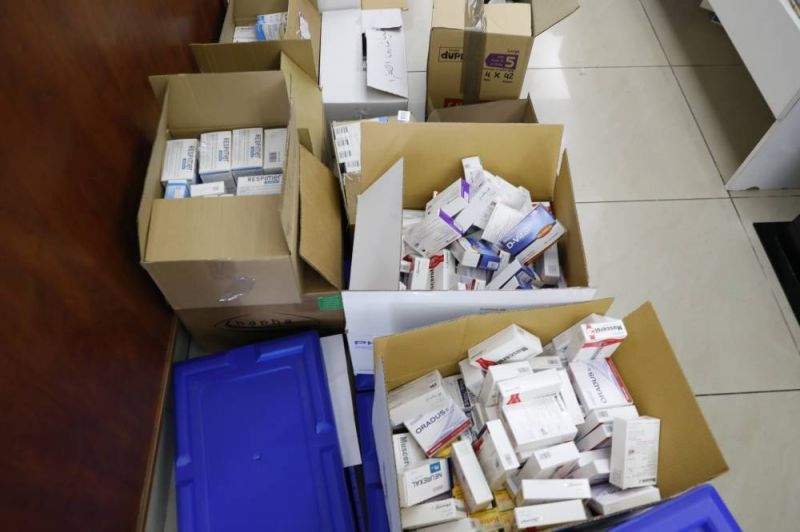
Importers are said to be stockpiling medical supplies as they await BDL to honor subsidy invoices that have been backed up for months. (Credit: Marc Fayad)
Want to get the Morning Brief by email? Click here to sign up.
Banque du Liban has not yet fulfilled a promise to pay out $180 million in invoices for subsidized medical supplies, the Health Ministry and importers told L’Orient Today. The ministry said on Thursday that BDL had pledged to make the payment, with supplies set to be distributed the following day, following outcry from hospitals and medical professionals about ongoing drug and supply shortages. Such essential goods are imported and sold at the official rate of LL1,500 to $1 through BDL’s essential goods subsidy program. They would cost about nine times as much for importers and downstream consumers if bought at the parallel market exchange rate, which is currently about LL13,000 to the greenback. However, importers have been holding onto stocks that they were forced to front the money for due to BDL’s delayed payments, unsure when — or whether — BDL will reimburse them. But with shortages persisting, the head of the drug importers’ association said pharmaceuticals are being released from warehouses without payments from BDL — although the head of the private hospital syndicate cast doubt on this claim, demanding “open visits” to importers’ warehouses. BDL declined to comment on the status of the $180 million payment.
The public administration employees’ association has called for a three-day strike starting today. The strike is in protest of a recommendation by the national disaster risk management unit that all public administration employees return to office-based work full time. The union cited the high cost of fuel and car maintenance, saying workers cannot afford the daily transportation costs at their present salaries, whose value has decreased significantly amid the economic crisis. The union is asking that office-based shifts make up 50 percent of working hours at most. In response, the cabinet’s secretary-general issued a statement noting that caretaker Prime Minister Hassan Diab had released a circular on March 26 calling for public agencies to adopt a work rotation with “not less than 50 percent” of employees being in the office and leaving it to administration heads to increase that percentage.
The State Shura Council issued a provisional ruling that a BDL circular permitting banks to pay out customers’ US dollar deposits at an exchange rate of LL3,900 is unlawful and that these account holders should be reimbursed in dollars. The council ordered implementation of the circular suspended until there is a final ruling on the case, although the enforcement mechanism is unclear. Lebanon’s banks have been grappling with a financial crisis due to a foreign currency shortage and, beginning in late 2019, commercial banks curtailed and then altogether prevented depositors from accessing their savings in dollars. Account holders are able to gain access to their money only by exchanging their deposits into the national currency at a rate of LL3,900 to the greenback — less than a third of the lira’s current value on the parallel exchange market.
The Strong Lebanon parliamentary bloc is today expected to release the details of a draft law focused on restructuring the government’s essential goods subsidy program and distributing direct financial assistance to families. Gebran Bassil, an MP and the head of the Free Patriotic Movement, which is part of the bloc, said the financial assistance would amount to $100 for each family, without specifying whether it would be a single or a recurring payment, or how or on what families would be able to spend it. In a news conference following a bloc meeting, Bassil claimed that the subsidy restructuring proposal would save BDL $3 billion a year. This is the second direct payment proposal by an official to support Lebanese families as the economic crisis deepens while the country lacks social safety nets to stave off disaster for residents. A proposal to provide 750,000 of Lebanon’s most vulnerable families with monthly payments of $210 is currently before Parliament for review and approval.